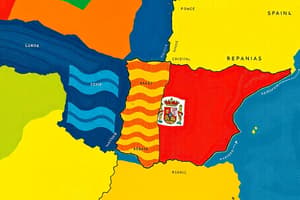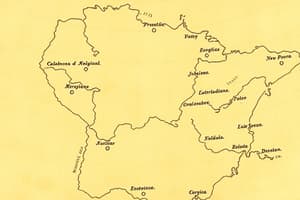Podcast
Questions and Answers
What was the primary role of a royal inspector, or visitador, in the colonies?
What was the primary role of a royal inspector, or visitador, in the colonies?
- To investigate and report on the administration (correct)
- To oversee military operations
- To lead community development programs
- To supervise financial transactions
What was a common issue during the early years of Spanish rule in western Mexico?
What was a common issue during the early years of Spanish rule in western Mexico?
- Judges were often unbiased.
- Corruption and bribery were prevalent. (correct)
- Officials strictly adhered to the law.
- The Spanish crown punished all corrupt officials.
What mechanism was commonly used to judge the performance of viceroys and their officials?
What mechanism was commonly used to judge the performance of viceroys and their officials?
- Elections by local councils
- Public opinion surveys
- Judicial reviews or residencias (correct)
- Monthly performance reports
What measure was implemented to limit corruption among Spanish officials?
What measure was implemented to limit corruption among Spanish officials?
What was one method employed by local officials to prepare for the arrival of a visitador?
What was one method employed by local officials to prepare for the arrival of a visitador?
How did the Spanish crown often respond to the misdeeds of colonial officials?
How did the Spanish crown often respond to the misdeeds of colonial officials?
What significant action could the crown take regarding the colonial administration?
What significant action could the crown take regarding the colonial administration?
Which statement best describes the authority of the visitador upon arrival?
Which statement best describes the authority of the visitador upon arrival?
What was a significant factor contributing to corruption among Spanish officials in the 16th century?
What was a significant factor contributing to corruption among Spanish officials in the 16th century?
What was notable about the viceroy positions during Spanish rule?
What was notable about the viceroy positions during Spanish rule?
What was the primary aspect of the Spanish administration of the colonial empire that hindered its effectiveness?
What was the primary aspect of the Spanish administration of the colonial empire that hindered its effectiveness?
What was the Spanish crown's main priority when appointing officials to colonial positions?
What was the Spanish crown's main priority when appointing officials to colonial positions?
In what way did the Spanish crown's emphasis on loyalty over competence manifest in the colonial administration?
In what way did the Spanish crown's emphasis on loyalty over competence manifest in the colonial administration?
How did the Spanish crown's approach to colonial administration impact the relationship between the crown and local elites?
How did the Spanish crown's approach to colonial administration impact the relationship between the crown and local elites?
What is implied by the phrase "oo little and do it slowly" in the context of the Spanish colonial administration?
What is implied by the phrase "oo little and do it slowly" in the context of the Spanish colonial administration?
Flashcards
Viceroy
Viceroy
The highest ranking official in a colony, responsible for overseeing administration and reporting to the crown.
Visitador
Visitador
A royal inspector sent by the crown to investigate the state of affairs in a colony. They had wide-ranging authority, often replacing the viceroy for the duration of their visit.
Residencia
Residencia
A formal review of an official's performance at the end of their term, involving public hearings and investigations.
Judicial Review
Judicial Review
Signup and view all the flashcards
Spectrum of Opinion
Spectrum of Opinion
Signup and view all the flashcards
Loyalty Over Competence
Loyalty Over Competence
Signup and view all the flashcards
Checks and Balances in Colonial Administration
Checks and Balances in Colonial Administration
Signup and view all the flashcards
Colonial Autonomy in Practice
Colonial Autonomy in Practice
Signup and view all the flashcards
Colonial Officials Making Decisions Without Royal Consent
Colonial Officials Making Decisions Without Royal Consent
Signup and view all the flashcards
The Spanish Colonial Bureaucracy
The Spanish Colonial Bureaucracy
Signup and view all the flashcards
Corruption in Spanish Colonies
Corruption in Spanish Colonies
Signup and view all the flashcards
Sale of Public Office
Sale of Public Office
Signup and view all the flashcards
Winking at Misdeeds
Winking at Misdeeds
Signup and view all the flashcards
Study Notes
The Political Administration of New Spain
- Viceroy Mendoza's administration philosophy emphasized "do little and do it slowly"
- This approach was not favored by reformers but aligned with royal wishes.
- 16th-century viceroys had considerable autonomy due to communication challenges; correspondence took months.
- Colonial officials often made rulings independently, awaiting royal approval.
- The phrase "Obedezco pero no cumplo" (I obey but do not execute) reflected instances where officials followed directives but did not enforce them
- The Hapsburg bureaucracy was ponderous, with reports sent detailing actions requiring further directives.
- The crown prioritized loyalty over competence in colonial officials as it was unable to micromanage vast territories
- Local elites were granted significant control because of the difficulties of managing a wide-ranging empire.
- Officials within colonial systems were encouraged to provide commentary on others' performance, and the crown was privy to a wider range of opinions than just those in a centralized administration.
- The viceroy, while most powerful, was subject to checks and restraints by the audiencia and other officials and local groups that could exert influences on the crown.
Studying That Suits You
Use AI to generate personalized quizzes and flashcards to suit your learning preferences.




